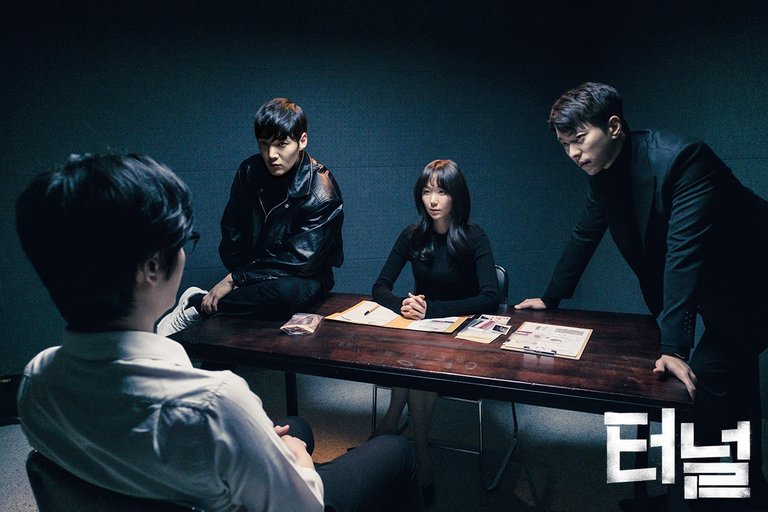
Greetings, humans of Hive! How is everyone doing? It's been a while.
Today I'm back with another Korean thriller series review, like the previous one I wrote, called "Signal" – if you hadn't seen it, you can check it here. The series I'm talking about today is called "Tunnel" (in hangul: 터널), it follows the same genre as Signal – I feel I'm kinda addicted to this type of series lately – it's a mix between police narrative and sci-fi – there's a lot of action, mysterious murders and investigation, along with the fantastic touch, which is the time traveling that occurs through an abandoned tunnel.
One might think Tunnel is just a mere copy of Signal due to its genre and overall similarities, but, of course it's not like that. It's true that both series were based on the same real criminal case called "Hwaseong serial murders" – one of the reasons I discovered this little gem by the way – however, unlike Signal, Tunnel deals with time traveling indeed, rather than past/present communication, as well as the connection between the main characters in Tunnel are even deeper than in Signal – the series takes it to another level. In addition, you can see consistency through the story arc until the very end, everything is well defined – although Tunnel deals with just one main case throughout the whole narrative, this doesn't make it neither boring nor repetitive, instead, the drama is able to sustain the mystery vibe with mastery.
¡Saludos, humanos de Hive! ¿Cómo están todos? Ha pasado un tiempo.
Hoy estoy de vuelta con otra reseña de una serie de suspenso coreana, como la anterior que escribí, llamada "Signal" – si no la has visto, puedes chequearla aquí. La serie de que hablaré hoy se llama "Tunnel" (en hangul: 터널), sigue el mismo género que Signal – siento que estoy un poco fanática por este tipo de series últimamente – es una mezcla entre narrativa policial y ciencia ficción – hay mucha acción, asesinatos misteriosos e investigación, junto con el toque fantástico, que es el viaje en el tiempo que ocurre a través de un túnel abandonado.
Se puede pensar que Tunnel es solo una mera copia de Signal debido a su género y similitudes generales, pero, por supuesto, no es así. Es cierto que ambas series se basaron en el mismo caso criminal real llamado "Asesinatos en serie de Hwaseong" – a propósito, una de las razones por las que descubrí esta pequeña joya – sin embargo, a diferencia de Signal, Tunnel trata realmente de viaje en el tiempo, en lugar de comuncación entre pasado/presente, así como la conexión entre los personajes principales en Tunnel es aún más profunda que en Signal – la serie la lleva a otro nivel. Además, puedes ver consistencia a lo largo del arco de la historia hasta el final, todo está bien definido – aunque Tunnel trata solo un caso principal a lo largo de toda la narrativa, esto no lo hace ni aburrido ni repetitivo, en cambio, el drama es capaz de mantener la onda misteriosa con maestría.
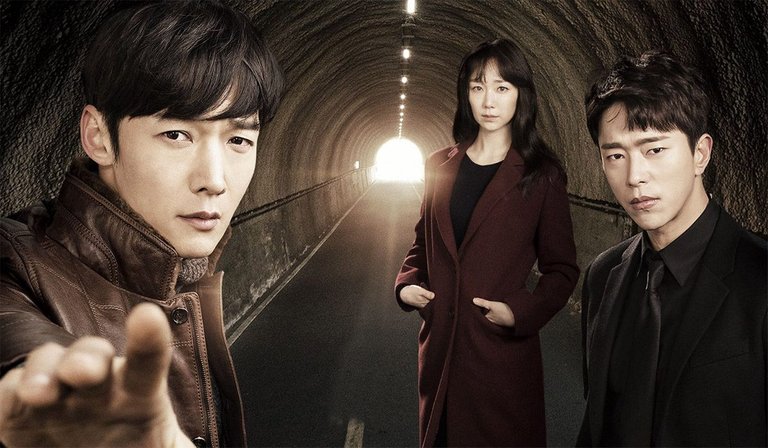
From left to right: Park Kwang-ho, Shin Jae-yi and Kim Sun-jae
Synopsis
Past
The year was 1986. Since the previous year, some violent murders had been taking place in the small city of Hwayang, although all the victims were women around their 20s, they weren't related at all. Unfortunately, the police hadn't found anything conclusive so far.
Park Kwang-ho (Choi Jin-hyuk) is a determined and passionate detective who is desperate to catch the culprit of these brutal crimes, especially because this cases were the reason why he couldn't spend time together with his beloved wife Shin Yeon-sook (Lee Si-ah). Along with his team, he started to investigate the neighborhood where the first victim was murdered and came across something very weird – many dogs from that neighborhood were missing and a girl had witnessed a high school student named Jung Ho-young in suspicious activity. Kwang-ho took him to the police station – he was sure Ho-young was the culprit who killed the women due to his psychopathy traits and also his taunts regarding the murders. However, the teenager confessed he had only killed the dogs, but not the women. Later on, Ho-young was released because the police confirmed his alibi.
In order to catch the killer in the act, Kwang-ho went alone for a stakeout where the last murder occurred, Hwayang-ri Tunnel. He saw someone smoking in the exactly place the last victim was found so he started running after the person – he had no doubts that one was the culprit. However, Kwang-ho was hit in the head by the runaway, making him faint and consequently losing the suspect. As soon as he managed to get out of the tunnel, he noticed things were different – suddenly, Kwang-ho saw himself in a totally different place than he was before.
El año era 1986. Desde el año anterior, algunos asesinatos violentos estaban ocurriendo en la pequeña ciudad de Hwayang, aunque todas las víctimas eran mujeres de 20 y pocos años, no tenían ninguna relación. Desafortunadamente, la policía no había encontrado nada concluyente hasta el momento.
Park Kwang-ho (Choi Jin-hyuk) es un detective determinado y apasionado que está desesperado por atrapar al culpable de estos crímenes brutales, especialmente porque estos casos eran la razón por la que no podía pasar tiempo con su amada esposa Shin Yeon-sook (Lee Si-ah). Junto con su equipo, él comenzó a investigar el vecindario donde asesinaron a la primera víctima y se topó con algo muy extraño – se faltaban muchos perros de aquel vecindario y una niña había visto a un estudiante de secundaria llamado Jung Ho-young en actividad sospechosa. Kwang-ho lo llevó a la estación de policía – estaba seguro de que Ho-young era el culpable de matar a las mujeres debido a sus rasgos de psicopatía y también a sus burlas con respecto a los asesinatos. Sin embargo, el adolescente confesó que solo había matado a los perros, pero no a las mujeres. Más tarde, Ho-young fue liberado porque la policía confirmó su coartada.
Para atrapar al asesino en el acto, Kwang-ho fue solo para una vigilancia donde ocurrió el último asesinato, el Túnel Hwayang-ri. Él vio a alguien fumando en el lugar exacto donde se encontró a la última víctima, entonces comenzó a correr tras la persona – no tenía dudas de que aquel era el culpable. Sin embargo, Kwang-ho fue golpeado en la cabeza por el fugitivo, haciéndolo desmayar y, en consecuencia, perdiendo al sospechoso. Luego que logró salir del túnel, notó que las cosas estaban diferentes – de repente, Kwang-ho se vio en un lugar totalmente diferente al que estaba antes.
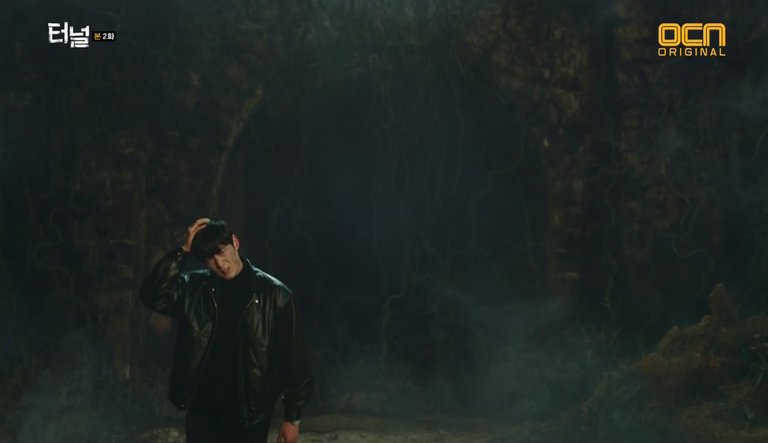
After getting out of the tunnel, Kwang-ho had traveled from 1986 to 2016
Present
On his way to Hwayang station, Kwang-ho almost got hit by a car – everything was foggy and weird, but he just realized he wasn't in the right place when he finally arrived at the station. There, he met lieutenant Kim Sun-jae (Yoon Hyun-min), a serious and cold-blooded man, with whom he had a terrible time because Kwang-ho thought Sun-jae was some weirdo pretending to be a cop – especially since Kwang-ho didn't know him and was still clueless about what was going on and where exactly he was.
To make things even stranger, someone also named Park Kwang-ho had just been transferred to that station in that day, but it clearly wasn't that Kwang-ho who had traveled 30 years ahead in time – the transferred one was born in 1988 and was a corporal who had never worked in violent cases. However, Kwang-ho decided to "adopt" his identity until he could go back to the past – or until the other Kwang-ho showed up. Anyway, how and why Kwang-ho ended up in 2016? And who was the 1988 Park Kwang-ho though?
En su camino a la estación de Hwayang, Kwang-ho casi fue atropellado por un carro – todo estaba neblinoso y extraño, pero sólo se dio cuenta de que no estaba en el lugar correcto cuando finalmente llegó a la estación. Allí conició al teniente Kim Sun-jae (Yoon Hyun-min), un hombre serio y de sangre fría, con quien la pasó terriblemente porque Kwang-ho pensó que Sun-jae era un bicho raro que pretendía ser policía – especialmente porque Kwang-ho no lo conocía y todavía no tenía idea de lo que estaba pasando y dónde estaba exactamente.
Para hacer las cosas aún más extrañas, alguien también llamado Park Kwang-ho había acabado de ser transferido a aquella estación aquel día, pero claramente no era aquel Kwang-ho que viajó 30 años adelante en el tiempo – el transferido había nacido en 1988 y era un cabo que nunca había trabajado en casos violentos. Sin embargo, Kwang-ho decidió "adoptar" su identidad hasta que pudiera volver al pasado – o hasta que apareciera el otro Kwang-ho. De todos modos, ¿cómo y por qué Kwang-ho terminó en 2016? ¿Y quién era el Park Kwang-ho de 1988?
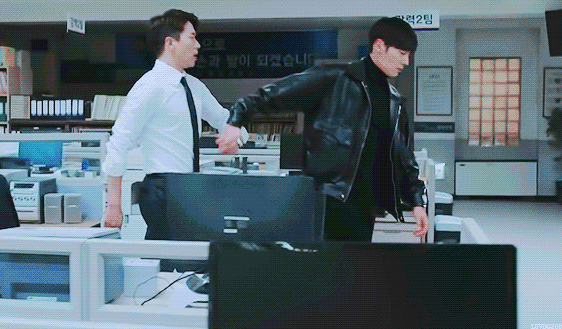
Sun-jae and Kwang-ho's first meeting and the beginning of their troubled relationship
Strange new world
Living in a strange and unknown world, under a fake identity, away from everyone he knew, Kwang-ho struggles to adapt to his new life, while he tries a way to come back to his world – in vain. The series varies from dramatic moments – like when the protagonist kept remembering he "had left" his wife alone – to comical ones – when he interacts with modern technology and constantly antagonizes Sun-jae – of course, all of this without losing the series' main focus.
Meanwhile, Kwang-ho had more questions than answers, and no one to help him properly. Why was he there? How could he go back? Where was his wife? What had happened to the killer? He starts trying to find Yeon-sook's whereabouts and also information about the past murders and what had happened during those 30 years.
Viviendo en un mundo extraño y desconocido, bajo una falsa identidad, lejos de todos los que conocía, Kwang-ho cuesta adaptarse a su nueva vida, mientras intenta una forma de volver a su mundo – en vano. La serie varía desde momentos dramáticos – como cuando el protagonista seguía recordando que "había dejado" sola a su esposa – hasta momentos cómicos – cuando interactúa con la tecnología moderna y antagoniza constantemente a Sun-jae – por supuesto, todo esto sin perder el foco principal de la serie.
Mientras tanto, Kwang-ho tenía más preguntas que respuestas y nadie que lo ayudara adecuadamente. ¿Por qué estaba allí? ¿Cómo podría volver? ¿Dónde estaba su esposa? ¿Qué le había pasado al asesino? Él comienza a tratar de encontrar el paradero de Yeon-sook y también información sobre los asesinatos pasados y lo que sucedió durante esos 30 años.

Kwang-ho amazed with a cellphone
Dots
In the past, Kwang-ho had noticed some odd little dots that the killer had left on his victims' heels – it was a pattern of permanent dots, as if they were tattooed, which meant the sequential number of each victim killed by him. Kwang-ho only could notice this pattern when the last body was found with six dots on it. However, when he went to check if there were other bodies with dots, he noticed there were actually five marked bodies, not six – so, where was the true fifth body?
Skipping to 2016, one day the police receives a report that parts of a body were found in the mountains – among them, an ankle with a foot that happened to have five dots on it. Kwang-ho immediately recognizes that pattern. The police confirms the body was there for about a month, making him conclude that the fifth victim was alive all these years. Kwang-ho assumes he was taken to 2016 in order to find a solution to that case, using his knowledge and experience from the past paired with the technology from the future. This event therefore becomes Kwang-ho's starting point of his long journey back home.
En el pasado, Kwang-ho había notado algunos puntitos extraños que el asesino había dejado en los talones de sus víctimas – era un patrón de puntos permanentes, como si estuvieran tatuados, lo que significaba el número secuencial de cada víctima asesinada por él. Kwang-ho solo pudo notar este patrón cuando se encontró el último cuerpo con seis puntos. Sin embargo, cuando fue fijarse si había otros cuerpos con puntos, él notó que en realidad había cinco cuerpos marcados, no seis – entonces, ¿dónde estaba el quinto cuerpo verdadero?
Saltando a 2016, un día la policía recibe un informe de que se encontraron partes de un cuerpo en las montañas – entre ellas, un tobillo con un pie que tendría cinco puntos. Kwang-ho reconoce inmediatamente el patrón. La policía confirma que el cuerpo estuvo allí durante aproximadamente un mes, haciéndolo concluir que la quinta víctima estuvo viva todos estos años. Kwang-ho asume que fue llevado a 2016 para encontrar una solución a ese caso, utilizando su conocimiento y experiencia del pasado junto con la tecnología del futuro. Por lo tanto, este evento se convierte en el punto de partida de Kwang-ho en su largo viaje de regreso a casa.
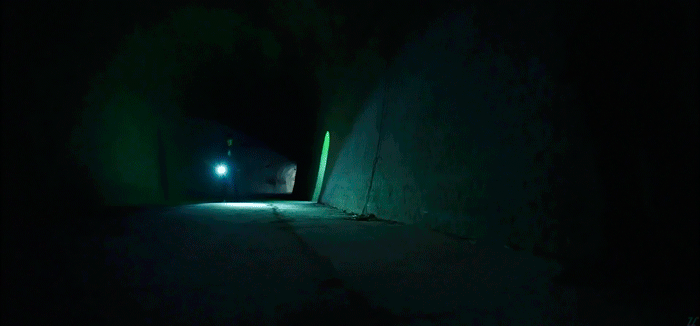
Kwang-ho and the killer inside the tunnel
Modus Operandi
Besides the marks, there were another similarities regarding the killer's methods – all the victims had been strangled with the pantyhose they were using, as well as they were all in skirts. For that reason, the police decided to get some help from Shin Jae-yi (Lee Yoo-young), a university professor specialized in criminal psychology. She believed that if they could understand the killer's mind, as well as why he had chosen such methods to murder, they would be able to catch him.
Well, it didn't take long for the killer to start killing again. A new victim, marked with seven dots, appeared shortly after the police team had found the fifth body and had started digging into the 80's cases, under Kwang-ho's request – but he wasn't the only one obsessed in catching the serial killer. A few years ago, Sun-jae had failed to arrest Jung Ho-young – the suspect high schooler from the past – for several murders he had committed following the same modus operandi. He's been on the run since then. At this point, Kwang-ho had no more doubts that Ho-young was the one who had killed the marked victims.
Además de las marcas, habían otras similitudes con respecto a los métodos del asesino – todas las víctimas habían sido estranguladas con las mediabachas que usaban, y todas estaban en faldas. Por esa razón, la policía decidió pedir ayuda de Shin Jae-yi (Lee Yoo-young), profesora universitaria especializada en psicología criminal. Ella creía que si pudieran entender la mente del asesino, así como por qué había elegido esos métodos para asesinar, podrían atraparlo.
Bien, el asesino no tardó mucho en empezar a matar otra vez. Una nueva víctima, marcada con siete puntos, apareció poco después de que el equipo policial encontrara el quinto cuerpo y comenzara a investigar los casos de los años 80, a pedido de Kwang-ho – pero él no era el único obsesionado en atrapar al asesino en serie. Hace unos años, Sun-jae no pudo arrestar a Jung Ho-young – el sospechoso estudiante de secundaria del pasado – por varios asesinatos que había cometido siguiendo el mismo modus operandi. Ha estado prófugo desde entonces. A esta altura, Kwang-ho no tenía más dudas de que Ho-young era quien había matado a las víctimas marcadas.
An old photo – people have already started to recognize (and suspect) Kwang-ho
Suspicions
Due to the wide knowledge Kwang-ho had about the old cases, he started to draw the attention of all the police team, especially of the Serious Crimes Division Chief, Jeon Sung-sik (Jo Hee-bong) – yes, Kwang-ho's rookie partner from the past. It didn't take too long for both to recognize each other, even though it was hard to Sung-sik to believe in what had happened to Kwang-ho. Henceforward, the series has already started to clarify, little by little, the deep connection between all the characters and Kwang-ho – from his sudden time traveling to the 1988 Kwang-ho's disappearing.
However, he wasn't the first one to find out 1988 Kwang-ho's whereabouts. Sun-jae, who was suspicious of his weird new partner since the beginning, was the one who discovered that 1988 Kwang-ho was, actually, dead. An overturned car was found and identified as Kwang-ho's and, next to it, there was 1988 Kwang-ho's body together with his badge. Instead of telling the Chief, Sun-jae rather called Doctor Mok Jin-woo (Kim Min-sang), the Police Medical Examiner and Sun-jae's personal friend, and asked him to keep it a secret for a while until he could uncover the truth. The autopsy results showed that 1988 Kwang-ho hadn't died in the car accident, but rather had been murdered, which made Sun-jae assume that Kwang-ho killed his namesake in order to steal his identity. How is he going to prove his innocence though? And who was 1988 Kwang-ho's real killer?
Debido al vasto conocimiento que Kwang-ho tenía sobre los casos antiguos, él comenzó a llamar la atención de todo el equipo policial, especialmente del Jefe de la División de Delitos Graves, Jeon Sung-sik (Jo Hee-bong) – sí, el compañero novato de Kwang-ho del pasado. No llevó mucho tiempo para que ambos se reconociesen, aunque a Sung-sik le costaba creer lo que le había pasado a Kwang-ho. De aquí en adelante, la serie ya ha comenzado a aclarar, poco a poco, la profunda conexión entre todos los personajes y Kwang-ho – desde su repentino viaje en el tiempo hasta el desaparecimiento de Kwang-ho de 1988.
Sin embargo, él no fue el primero en descubrir el paradero de Kwang-ho de 1988. Sun-jae, que sospechaba de su extraño nuevo compañero desde el principio, fue quien descubrió que Kwang-ho de 1988 estaba, en realidad, muerto. Un carro volcado fue encontrado y identificado como el de Kwang-ho y, junto a él, estaba el cuerpo de Kwang-ho de 1988 junto con su distintivo. En lugar de decírselo al jefe, Sun-jae llamó al doctor Mok Jin-woo (Kim Min-sang), el médico forense de la policía y amigo personal de Sun-jae, y le pidió que lo mantuviera en secreto por un tiempo hasta que pudiese descubrir la verdad. Los resultados de la autopsia mostraron que Kwang-ho de 1988 no había muerto en el accidente de carro, sino que había sido asesinado, lo que hizo que Sun-jae supusiera que Kwang-ho mató a su homónimo para robar su identidad. Entonces, ¿cómo va a probar su inocencia? ¿Y quién era el verdadero asesino de Kwang-ho de 1988?

Another viewpoint
Well, I don't want to go too deep into this subject to avoid major spoilers but I really need to comment on the series' mid to end plot twists, which are related to the murders and, of course, the murderer. It's very common to see thriller/investigative shows that let the viewers know practically all the events that are happening, or will happen, out of the protagonist's sight – especially if it's related to the evil core of the narrative – so the viewers' knowledge about the story is always one step ahead compared to the protagonist's. This natural omniscience allows the viewer to speculate what is going to happen afterwards. However, Tunnel shows us a different point of view – not all events are shown, so the viewer is kind of "tricked" by this hidden part of the story until around the last few episodes. I personally liked this plot twist method, since the pieces of the big puzzle were being introduced as the story progressed – sometimes a bit too slowly – and consequently both characters and viewers started to notice together that something was off regarding the already known murder evidences, letting us team up with the protagonists, in an immersive way, in order to unravel this killing game.
Bien, no quiero profundizar mucho en este tema para evitar gran spoilers, pero realmente necesito comentar sobre los giros de la trama de la mitad al final de la serie, que están relacionados con los asesinatos y, por supuesto, con el asesino. Es muy común ver programas de suspenso/investigación que permiten a los espectadores saber prácticamente todos los eventos que están sucediendo, o sucederán, fuera de la vista del protagonista – especialmente si está relacionado con el núcleo malvado de la narrativa – entonces el conocimiento de los espectadores sobre la historia siempre está un paso adelante en comparación con el protagonista. Esta omnisciencia natural permite al espectador especular sobre lo que sucederá después. Sin embargo, Tunnel nos muestra un punto de vista diferente – ni todos los eventos son mostrados, así que el espectador es "engañado" por esta parte oculta de la historia hasta los últimos episodios. Personalmente, me gustó este método de giro de la trama, ya que las piezas del gran rompecabezas se iban introduciendo a medida que avanzaba la historia – a veces demasiado lento – y, en consecuencia, tanto los personajes como los espectadores comenzaron a notar juntos que algo andaba mal con respecto a las ya conocidas evidencias del asesinato, permitiéndonos unir con los protagonistas, de forma inmersiva, para desentrañar este juego de matar.
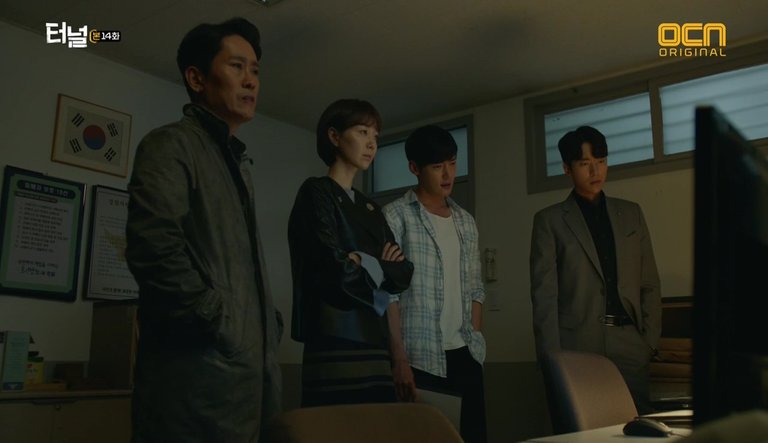
Human nature
Certainly, the series deals with more topics other than the good old crime solving that was discussed through this review. Back to the 80's, one of the reasons why Kwang-ho continued his incessant search for the killer, even though the police couldn't find any trace of the killer's identity, was his empathy towards the victims' families, after having closely followed the suffering of those who had lost their loved ones – there were a man and his little son, in particular, whose wife was one of the killer's victims, to whom Kwang-ho promised he'd arrest the culprit at any costs. Tunnel provides deep reflections concerning the human aspect of the crime solving world – is catching the criminal the main objective? How about the bereaved families, do they only wish to see the criminal being punished in court? Is this enough for them? Does this heal the pain of a loss? – after all, the main characters could also relate to this kind of pain since they knew, more than anyone, how it was like to lose someone close.
Moreover, thanks to the insertion of Jae-yi character as a criminal psychology researcher, the drama also manages to explore the dark side of humanity by portraying criminals with some conduct disorders, such as psychopathy, sociopathy – and clarifying the difference between them – antisocial behavior and even pyromania. Plus, it just doesn't portray but also exemplifies the reasons and motivations behind their behaviors. Tunnel shows what's inside the criminals' minds, why they do such horrendous things – even though a crime can never be justified, they come up with the most absurd excuses to justify it.
Sin duda, la serie trata de más temas además de la buena y vieja resolución de crímenes que se discutió a través de esta reseña. Volviendo a los años 80, una de las razones por las que Kwang-ho continuó su incesante búsqueda del asesino, aunque la policía no pudo encontrar ningún rastro de la identidad del asesino, fue su empatía hacia las familias de las víctimas, después de haber acompañado de cerca el sufrimiento de aquellos que habían perdido a sus seres queridos – había un hombre y su pequeño hijo, en particular, cuya esposa fue una de las víctimas del asesino, a quien Kwang-ho prometió que arrestaría al culpable a toda costa. Tunnel ofrece reflexiones profundas sobre el aspecto humano del mundo de la resolución de crímenes – ¿es el objetivo principal atrapar al criminal? ¿Y las familias en duelo, ellos solo desean ver al criminal castigado en la corte? ¿Es esto suficiente para ellos? ¿Esto alivia el dolor de una pérdida? – a fin de cuentas, los personajes principales también podían relacionarse con este tipo de dolor ya que sabían, más que nadie, cómo era perder a alguien cercano.
Además, gracias a la inserción de la personaje de Jae-yi como investigadora de psicología criminal, el drama también logra explorar el lado oscuro de la humanidad al retratar a criminales con algunos trastornos de conducta, como la psicopatía, la sociopatía – y aclarando la diferencia entre ellas – la conducta antisocial e incluso la piromanía. Y también, simplemente no retrata sino que también ejemplifica las razones y motivaciones detrás de sus comportamientos. Tunnel muestra lo que hay dentro de la mente de los delincuentes, por qué hacen cosas tan horrendas – aunque nunca se puede justificar un delito, ellos inventan las excusas más absurdas para justificarlo.

I never get tired of seeing Kwang-ho interacting with technology
Final thoughts
The way the plot unfolds as the drama leads to its noticeable climax is really clever – from the "random" secondary incidents, which connected somehow with the main one, to the characters development, which turned out to be deeper than I thought it would be – in the end, everything had a purpose. I need to give a huge shout-out to Lee Eun-mi, the screenwriter, who did a good job at tying all the knots until the very end and giving the word "unpredictability" a whole new meaning.
Sadly, Tunnel ended up having some plot holes and numerous foolish mistakes which, in my opinion, could have perfectly been avoided. In first place, the drama didn't explore sufficiently the time travel trope, it was just emphasized at one time or another – although time traveling seemed to be one of the series' focuses in the beginning, it turned out to take a different path, focusing more on psychological issues. And speaking of which, the evil core of the series was amazingly explored due to this topic, causing a significant shift in the viewer's perspective regarding the criminals and mental disorders themselves – on the other hand, although the drama also showed the protagonists' vulnerabilities and traumas, it was considerably weaker and shallower than the antagonists' development – their roles were kind of reversed, but, in the end, the evil core deserved the spotlight. Still about pointless details, one thing that really annoyed me was the overuse of both the "dumb police" cliché and that habit of making the most stupid decisions during dangerous situations. The series as a whole – from the plot development to the great off-screen ending – didn't deserve to be ruined by such ridiculous cop stereotypes.
As for the OST, unfortunately Tunnel has just one original song called "Circle of Life" (in hangul: 세상은 다시) by Kim Dong-uk. However it was the opening theme, called "The Leopard of the Mt. Killimanjaro" (in hangul: 킬리만자로의 표범), that stole the show – along with the two BTS songs, Fire and Save me, that were played during the second episode. They should have invested more in the OST, for sure.
La forma en que la trama se desarrolla a medida que el drama se dirige a su perceptible clímax es realmente ingenioso – desde los incidentes secundarios "aleatorios", que se conectaron de alguna manera con el principal, hasta el desarrollo de los personajes, que resultó ser más profundo de lo que pensé – al final, todo tenía un propósito. Necesito dar un gran saludo a Lee Eun-mi, la guionista, que hizo un buen trabajo atando todos los nudos hasta el final y dando a la palabra "imprevisibilidad" un significado completamente nuevo.
Lamentablemente, Tunnel terminó teniendo algunos huecos en la trama y numerosos errores tontos que, en mi opinión, podrían haberse evitado perfectamente. En primer lugar, el drama no exploró suficientemente el tropo del viaje en el tiempo, solo lo enfatizó en un momento u otro – aunque viaje temporal parecía ser uno de los enfoques de la serie al principio, resultó tomar un camino diferente, centrándose más en cuestiones psicológicas. Y hablando de eso, el núcleo malvado de la serie fue increíblemente explorado debido a este tema, provocando un cambio significativo en la perspectiva del espectador con respecto a los criminales y los trastornos mentales en sí – por otro lado, aunque el drama también mostró las vulnerabilidades y traumas de los protagonistas, fue considerablemente más débil y superficial que el desarrollo de los antagonistas – sus papeles se invirtieron un poco, pero, al final, el núcleo malvado mereció ser el foco. Aún hablando de detalles sin sentido, una cosa que realmente me molestó fue el uso excesivo del cliché de "policía tonto" y ese hábito de tomar las decisiones más estúpidas en situaciones peligrosas. La serie en su conjunto – desde el desarrollo de la trama hasta el gran final fuera de la pantalla – no merecía ser arruinada por esos ridículos estereotipos de policía.
En cuanto al OST, desafortunadamente Tunnel tiene solo una canción original llamada "Circle of Life" (en hangul: 세상은 다시) de Kim Dong-uk. Sin embargo, fue el tema de apertura, llamado "The Leopard of the Mt. Killimanjaro" (en hangul: 킬리만자로의 표범), el que se robó el show – junto con las dos canciones de BTS, Fire y Save me, que se tocaron durante el segundo episodio. Deberían haber invertido más en el OST, con certeza.
My rating
Plot – 
Acting – 
Pace – 
Production – 
OST – 
Ending – 
Thanks for reading, I hope you guys like it! Let me know your opinion in the comments. See ya! 👽🖖
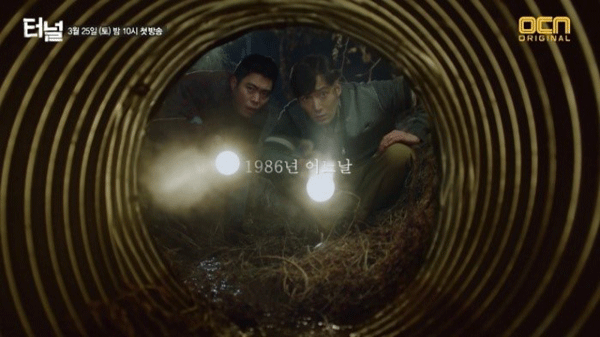
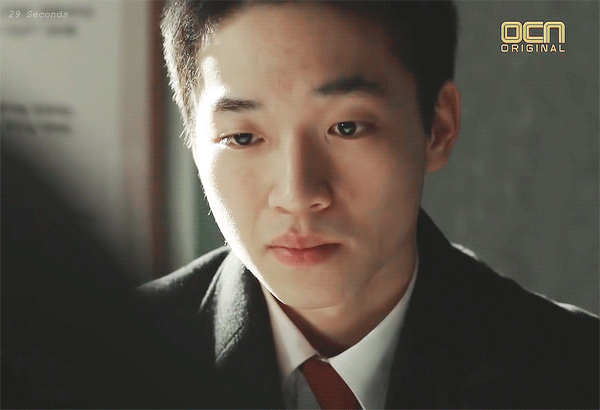
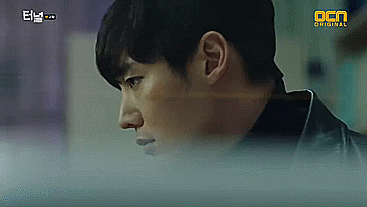
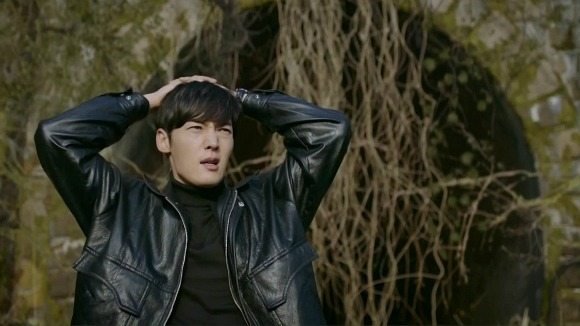
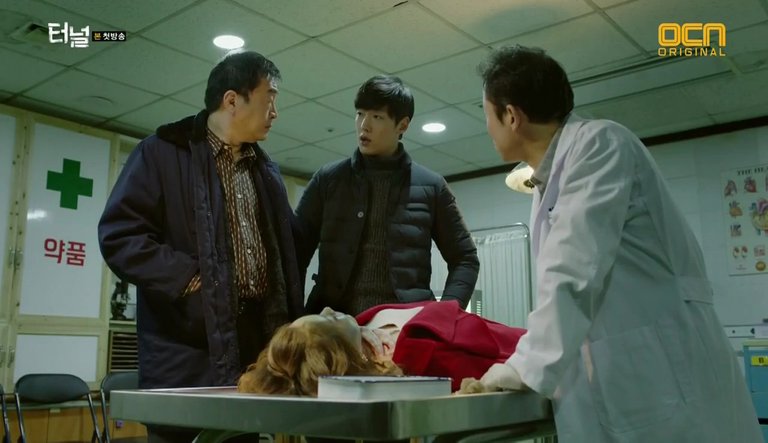
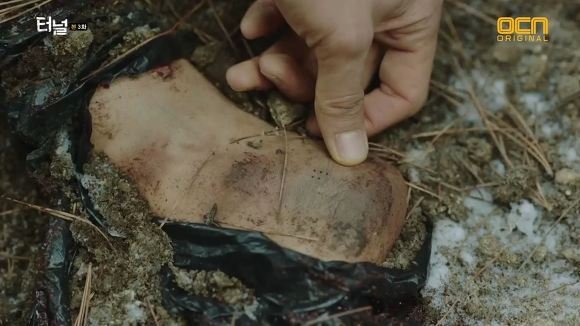

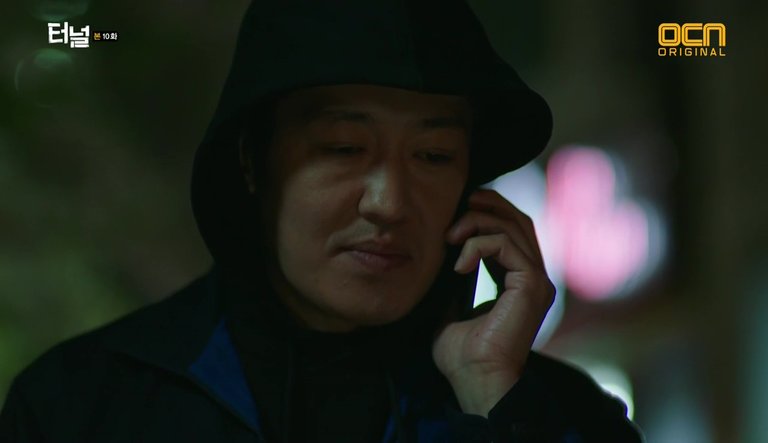
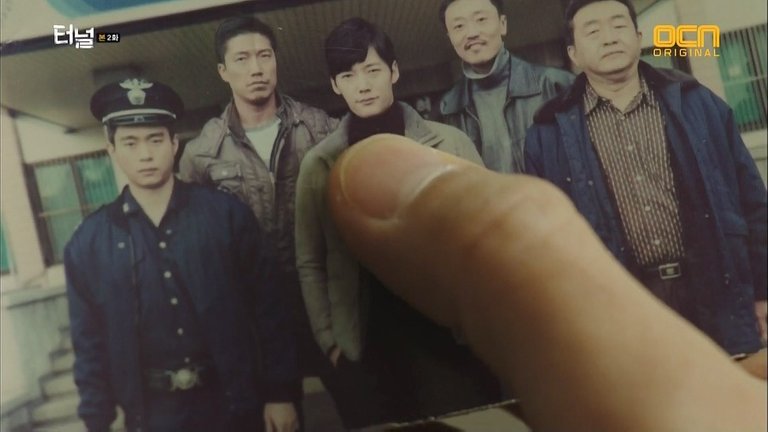



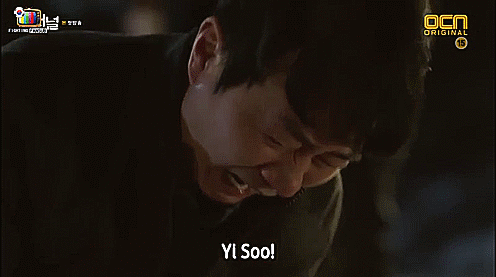

Obrigado por promover a comunidade Hive-BR em suas postagens.
Vamos seguir fortalecendo a Hive
What a complete review, even the soundtrack was mentioned! Well but still it is worth to watch it right? it isn't a new movie, lets see if I have some time

!1UP
Las personas pudieran pensar que una serie de tantos capítulos basada en un solo caso sería aburrida, pero la verdad es que suele funcionar muy bien, lo descubrí en dos series coreanas que también son de policías, y una tiene fantasía. No sabía que me gustaría tanto la combinación hasta que la Vi allí, me gustó mucho tu reseña, la anoté porque me encantan las series coreanas de este estilo. Saludos 🌻
Dear @zombialien, we need your help!
The Hivebuzz proposal already got important support from the community. However, it lost its funding a few days ago and only needs a bit more support to get funded again.
May we ask you to support it so our team can continue its work?
You can do it on Peakd, ecency,
https://peakd.com/me/proposals/199
Your support will be really appreciated.
Thank you!